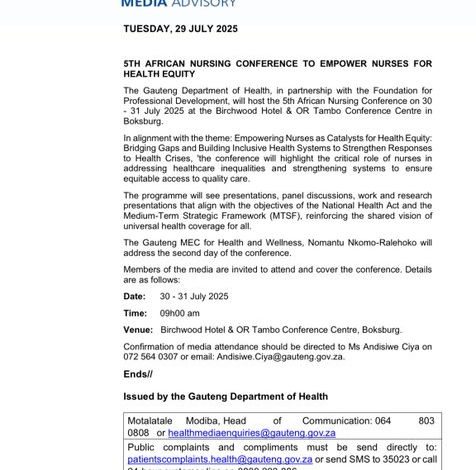How Trauma Nurses in Gauteng Are Saving Lives – Even After Hours

Trauma care is a vital component of the healthcare system in Gauteng. Nurses are the unsung heroes who often work tirelessly, saving lives even beyond their scheduled shifts. These healthcare professionals play a crucial role in managing critical injuries from various traumatic events. Their dedication extends well into after-hours, ensuring that patients receive the best care possible at all times.

In this article, we will explore how trauma nurses in Gauteng are making an impact. We will discuss why their efforts are so essential and how the province is supporting them in their crucial work.
RELEVANT ARTICLE: MEC Nkomo-Ralehoko Calls for Nurses to Be Seen as Health System Leaders
Table of contents
- The Vital Role of Trauma Nurses in Gauteng
- Trauma Care Services in Gauteng
- The After-Hours Commitment of Trauma Nurses
- The Benefits of After-Hours Care
- How Trauma Nurses Contribute to Patient Outcomes
- Government Support for Trauma Nurses
- The Emotional Strength of Trauma Nurses
- The Future of Trauma Care in Gauteng
- How to Support Trauma Nurses in Gauteng
- The Heart of Healthcare
The Vital Role of Trauma Nurses in Gauteng
Trauma nurses are specialized professionals who manage patients suffering from traumatic injuries. These injuries may arise from accidents, violence, or other sudden events. Trauma nursing is a challenging field. It requires nurses to possess quick decision-making skills, the ability to assess complex injuries, and the expertise to stabilize patients until they can receive more comprehensive care.
Gauteng, one of South Africa’s most populous provinces, faces a high number of trauma cases. This makes trauma nurses indispensable. Whether they are dealing with road accidents, gunshot wounds, or injuries caused by falls, these nurses ensure that patients are stabilized and receive immediate care. The trauma care teams in the province often work around the clock. This ensures patients have access to continuous care, even after regular working hours.
Trauma Care Services in Gauteng
The Gauteng Department of Health (GDoH) has made substantial improvements to healthcare facilities to address the rising number of trauma cases. As part of a strategic initiative, diagnostic tools such as X-ray machines have been installed in community health centres (CHCs) across the province. This improves trauma care services. These machines play a critical role in diagnosing injuries. They allow trauma nurses and doctors to detect fractures, infections, and other conditions quickly, enabling timely interventions.
In addition to diagnostic tools, the healthcare system in Gauteng has also seen improvements in hospital infrastructure. This directly impacts trauma care. The GDoH has prioritized upgrading facilities and providing better resources to support trauma care teams in dealing with emergencies.
The After-Hours Commitment of Trauma Nurses
Nurses in Gauteng, especially those working in trauma care, often go beyond their job descriptions to provide life-saving care to their patients. Many work overtime, picking up additional shifts when needed, especially when the hospital is under strain from high patient volumes. This dedication is particularly vital during the night and weekend shifts. During these times, fewer healthcare professionals are available, yet trauma cases still flood the emergency rooms.
For instance, hospitals like Chris Hani Baragwanath Academic Hospital are among the busiest in the country. They see a high volume of trauma cases, including severe burns, head injuries, and broken bones. Trauma nurses at these institutions are trained to handle these complex cases and provide immediate care. This level of care is maintained even during after-hours when the stakes are at their highest.
The Benefits of After-Hours Care
Providing trauma care after hours is not just a matter of convenience; it’s a matter of survival. Trauma patients often face the risk of complications if not treated promptly. The availability of skilled trauma nurses around the clock helps prevent worsening of injuries, complications from infections, or even death. With the help of trauma nurses, patients are given the best chance for survival, even when injuries are severe.
After-hours care is particularly critical in rural or underserved areas of Gauteng, where patients may not have quick access to specialized trauma care. In these instances, trauma nurses can intervene immediately, assessing the situation, providing first aid, and ensuring patients are safely transferred to higher-level care if necessary.
How Trauma Nurses Contribute to Patient Outcomes
The skills and expertise of trauma nurses directly influence the recovery and survival rates of trauma patients. Their role in providing initial trauma care; such as controlling bleeding, administering oxygen, and stabilizing patients; is vital. Nurses also play an essential role in monitoring patients’ progress, adjusting treatments as needed, and ensuring that patients receive the necessary follow-up care after their injuries.
Trauma nurses in Gauteng are not only skilled at managing physical injuries but also provide emotional support to patients and their families. This holistic approach to care has a profound impact on patients’ overall recovery and experience in the healthcare system.

Government Support for Trauma Nurses
The Gauteng government recognizes the importance of trauma nurses and is committed to supporting them through training and professional development. Initiatives to improve working conditions, such as providing mental health support and resources for coping with stress, have been implemented. These measures aim to reduce burnout and help nurses perform at their best, even under high-pressure circumstances.
Additionally, the GDoH is investing in modern healthcare infrastructure and digital tools to further empower trauma nurses. These investments ensure that trauma nurses have access to up-to-date equipment and resources that help them perform their jobs effectively.
The Emotional Strength of Trauma Nurses
Working in trauma care can take a toll on a nurse’s emotional and mental well-being. Nurses regularly witness severe injuries, loss of life, and emotional trauma, which can be overwhelming. Despite these challenges, trauma nurses in Gauteng display immense emotional strength and resilience. They are not only medical professionals but also caregivers who provide comfort and reassurance to patients and their families in the most trying times.
By offering empathy and compassion, trauma nurses help patients cope with the emotional aftermath of their injuries. This emotional care is just as important as the physical care they provide and contributes significantly to the healing process.
The Future of Trauma Care in Gauteng
As trauma care continues to evolve in Gauteng, the role of nurses will become even more vital. The introduction of new technologies, such as artificial intelligence and digital health tools, is already transforming healthcare delivery. However, the human connection and expertise that nurses provide cannot be replaced by technology.
Looking ahead, there is a growing need for collaboration between public and private healthcare sectors to address the challenges faced by trauma nurses. By sharing resources, knowledge, and expertise, healthcare providers can improve trauma care and ensure better patient outcomes across the province.
ALSO READ: 2026 Nursing Diploma Intake at KZN College of Nursing
How to Support Trauma Nurses in Gauteng
Supporting trauma nurses involves more than just acknowledging their work; it requires tangible action. This includes improving their working conditions, offering competitive salaries, and providing professional development opportunities. Public awareness campaigns highlighting the contributions of trauma nurses can also help boost morale. They can ensure that these healthcare professionals feel valued for the essential work they do.
Moreover, fostering an environment where trauma nurses feel supported, both mentally and physically, is crucial for retaining skilled professionals in the healthcare system. Providing adequate staffing levels and ensuring that trauma nurses have access to resources such as counseling can help prevent burnout. This ensures high-quality care for trauma patients.
Stressed and in pain? Discover how Gauteng clinics are stepping up with new support services to help you heal. Click here to read more.
The Heart of Healthcare
The dedication of trauma nurses in Gauteng goes far beyond what is expected of them. These professionals work long hours, often sacrificing their personal time. They do this to ensure that trauma patients receive the best care possible. Whether it’s during a hectic day shift or a quiet night shift, trauma nurses play a critical role in saving lives. Their expertise, compassion, and unwavering commitment make them an essential part of the healthcare system in Gauteng.




